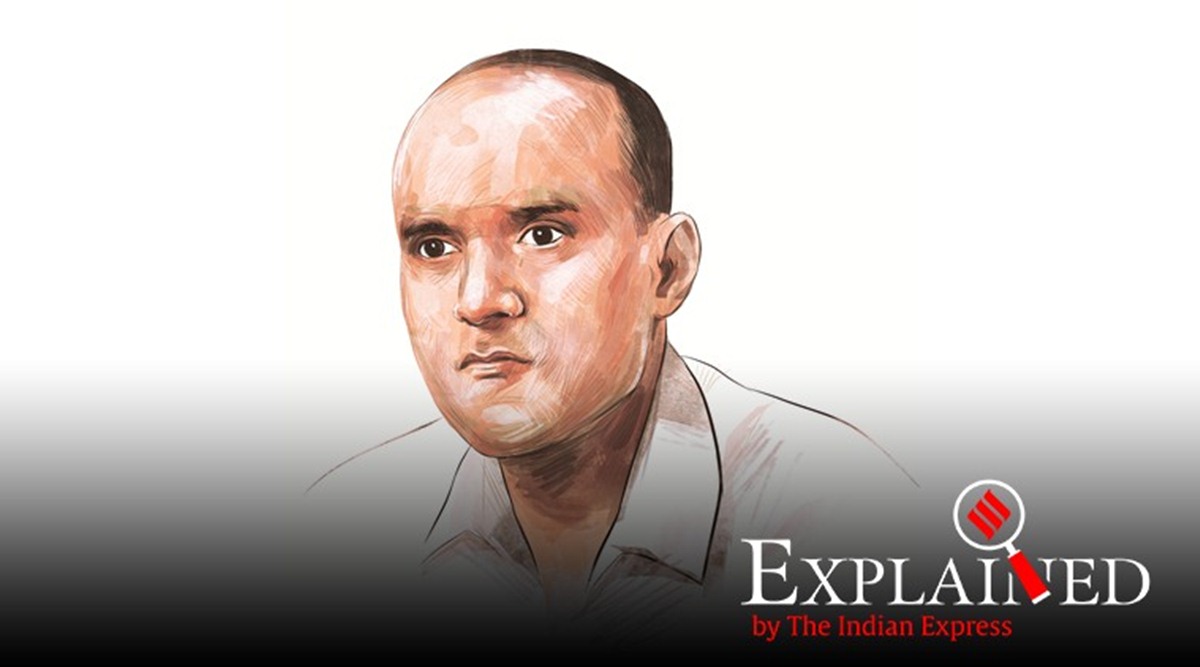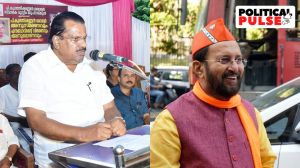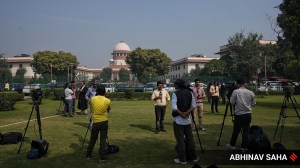- India
- International
Explained: A Pakistan lawyer for Kulbhushan Jadhav and other developments
Kulbhushan Jadhav, a retired officer of the Indian Navy, was arrested allegedly on March 3, 2016, but India was informed only on March 25, 2016, when the Pakistan Foreign Secretary raised the matter with the Indian High Commissioner in Islamabad.
 New Delhi moved the International Court of Justice (ICJ) at The Hague in the Netherlands in May 2017 against the “farcical trial” of Jadhav by a military court in Pakistan.
New Delhi moved the International Court of Justice (ICJ) at The Hague in the Netherlands in May 2017 against the “farcical trial” of Jadhav by a military court in Pakistan.
More than four years after he was arrested by Pakistan in March 2016 and subsequently sentenced to death a year later, Kulbhushan Jadhav might get legal help — if a Pakistan court’s order on Monday (August 3) is implemented.
Jadhav, a retired officer of the Indian Navy, was arrested allegedly on March 3, 2016, but India was informed only on March 25, 2016, when the Pakistan Foreign Secretary raised the matter with the Indian High Commissioner in Islamabad.
New Delhi then moved the International Court of Justice (ICJ) at The Hague in the Netherlands in May 2017 against the “farcical trial” of Jadhav by a military court in Pakistan. In an order passed in April 2017, the military court had sentenced the 48-year-old Jadhav to death on charges of espionage and terrorism.
In July last year, the ICJ, in its verdict, had directed Pakistan to allow consular access to Jadhav, and to effectively review the death sentence. The court had observed that Pakistan had breached international law by not granting him consular access.
So, what happened on Monday (August 3) regarding Kulbhushan Jadhav?
The Islamabad High Court on Monday (August 3) said India should be given “another chance” to appoint a lawyer to defend him. Pakistan’s Attorney General Khalid Javed Khan said the court asked the Pakistan government to allow Indian authorities to appoint a lawyer who is licensed to practice in Pakistan. “Now that the matter is in the high court, why not give India another chance,” Chief Justice Athar Minallah, who headed the two-member bench, said.

And what exactly did the order of the court say?
“The government of Pakistan shall once again inform Jadhav regarding his rights… he shall be specifically informed of his right to avail the statutory remedy… and to authorise the Government of India to arrange legal representation on his behalf,” the court said in its written order.
“Pakistan government shall communicate this order to the Government of India, the latter shall be at liberty to make appropriate arrangements on behalf of Jadhav,” it said.
OK, so can Indian lawyers assist a Pakistani lawyer?
No such option has been given so far.
But why didn’t India appoint a lawyer earlier?
The Indian High Commission in Islamabad had indeed, hired a lawyer earlier. But things did not work out as planned.
And why did that happen?
The lawyer needed a set of documents to file a review petition at the Islamabad High Court. The first and foremost was the crucial document, “a power of attorney” signed by Jadhav himself. And then there were documents such as FIRs, the charge sheet, and the orders and judgments of the Pakistani court, including a Field general court martial.
What was the problem with getting a power of attorney from Jadhav?
Pakistan created problems. When Indian diplomats went to meet Jadhav on July 16, they were not given unimpeded and unhindered consular access. These diplomats were not allowed to hand over documents to him. They were also not allowed to obtain a power of attorney from Jadhav.
The Ministry of External Affairs said that Pakistani officials with an “intimidating demeanour” were present in close proximity of Jadhav and the Indian diplomats, despite protests from the Indian side. A camera was visible and that indicated that the conversation with Jadhav was being recorded.
Jadhav himself was visibly under stress and indicated that clearly to the diplomats, the MEA said.
The arrangements did not permit a “free conversation” between them. The diplomats could not engage Jadhav on his legal rights and were prevented from obtaining his “written consent for arranging his legal representation” — the power of attorney.
📣 Express Explained is now on Telegram. Click here to join our channel (@ieexplained) and stay updated with the latest
And what about remaining set of documents?
The Indian High Commission in Islamabad has made repeated requests for access to documents related to the case. But Pakistan, after initially saying that the documents can only be handed over to an authorised Pakistani lawyer, has refused to cooperate.
“To our surprise, as advised by the Pakistani authorities, when the authorised Pakistani lawyer approached the concerned authorities, they declined to hand over the documents to the lawyer,” the MEA official spokesperson, Anurag Srivastava, had said on July 23.
So what happened then?
In the absence of “unimpeded” consular access to Jadhav, and to the relevant documents, India tried to file a petition on July 18. However, the Pakistani lawyer informed the Indian High Commission that a review petition could not be filed in the absence of a power of attorney and supporting documents related to Jadhav’s case.
Which brings us back to square one.
Yes, it does.
And what about the latest order by the court?
The latest court order revives the chances of the lawyer being given access to the documents. The Indian side believes that unless a lawyer is given all the documents — power of attorney from Jadhav and all the relevant FIRs, chargesheets, military court’s judgment, etc — there can be no headway.
Does that mean Pakistan will have to allow Indian diplomats to get the power of attorney from Jadhav, and the Pakistan government will have to provide all the documents?
Technically, yes. But again, for that, Pakistan has to provide unimpeded and unhindered consular access, where the Indian diplomats can “freely” discuss the case details with Jadhav and get the power of attorney signed by him.
What then would be the next step?
Pakistan has to inform the Indian government through official diplomatic channels about the court order. And upon Indian side’s request, Islamabad has to grant unimpeded consular access to Jadhav.
For the record, over the past year, India has requested consular access 12 times. So far, Pakistan has not provide unimpeded access. In September last year, consular access was provided, but the meeting was recorded and Pakistani officials were present in the room.
Will the court now follow up on this?
Yes. The Islamabad High Court bench headed by Chief Justice Athar Minallah has now appointed three prominent Pakistani lawyers as amici curiae.
They are Abid Hassan Manto, Hamid Khan, and Makhdoom Ali Khan. Manto and Hamid Khan are both Senior Advocates of the Supreme Court and former presidents of the Supreme Court Bar Association; Makhdoom Ali Khan is Senior Advocate of the Supreme Court and a former Attorney General of Pakistan.
They have been appointed as amici curiae for legal assistance in general and, in particular, to ensure that the judgment of the International Court is effectively implemented.
Considering the sensitive nature of the matter, the court has also said that a larger bench should be constituted, and set the next date of hearing for September 3 — a month from now.
How has India reacted to the latest developments?
While there has been no official word after Monday’s court directions, last week, the MEA spokesperson had said that Islamabad has “blocked all the avenues for an effective remedy” available for India. The spokesperson had said that India reserves its position in this matter, and which includes the “right to avail of further remedies”, and “we stand committed to protect the life” of Kulbhushan Jadhav.
More Explained
EXPRESS OPINION
Apr 26: Latest News
- 01
- 02
- 03
- 04
- 05










































